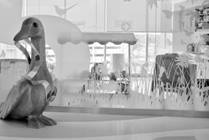Search Results
Viewing: 431-440 of 1460 | All

Article
Learning Problems
If you are worried about your child’s development, learning, attention, thinking or social skills, you are not alone. Many families struggle with these problems. Here are tips and resources to help your family find ways to assist your child.
Article
Cardiac Catheterization: Care at Home (Adult)
You have had a cardiac catheterization. Learn how to care for the cath site.

Condition
Hypothyroidism
This Helping Hand™ explains the cause, types, symptoms, diagnosis, and treatment for hypothyroidism.
Pelvic Inflammatory Disease (PID)
Pelvic inflammatory disease (PID) is an infection in the uterus, the fallopian tubes or the ovaries.
Staphylococcus - Scalded Skin Syndrome (SSSS)
Staphylococcus-Scalded Skin Syndrome is a skin infection caused by a bacteria called Staphylococcus aureus. This infection produces a toxin that can affect skin all over the body.
Article
Wrist Sprains
Most often wrist sprains are caused by a fall on an outstretched arm. The wrist is forced back into hyperextension, stretching or tearing the soft tissue in the area including the ligaments.
Article
Poison Prevention Resources
Access poison prevention materials and program resources for the general public and for community-based organizations.

Condition
Precocious (Early) Puberty in Children
This Helping Hand™ is about early puberty in children. Sometimes, puberty can start earlier and before signs show.

Condition
Respiratory Distress
This Helping Hand™ is about respiratory distress illnesses in children. These illnesses cause breathing problems. Call 911 or take your child to the closest emergency room if you think they're having trouble breathing.

Condition
Sports Medicine: Degenerative Disc Disease
Degenerative disc disease is the slow breakdown of one or more intervertebral discs.
